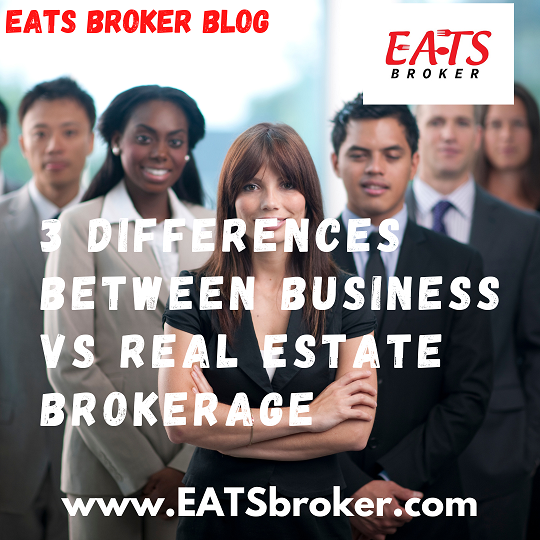Most would agree when it’s time for you to buy a home you look for a real estate broker. When you are considering to sell or buy a business, with or without real estate attached, you look for a business broker or if you are selling or buying a restaurant find a Restaurant Broker. Both transactions require the transfer of assets but the difference in the closing process, forms, skill sets, time investment, county regulations, licenses required, and involved professional parties are enormous.
Dominique Maddox, an experienced Restaurant Broker of 8 years and former Realtor for 2 years, identified 3 differences between Business vs Real Estate Brokerage. A brief review here will help you, whether you are considering buying or selling a business, to understand the differences.
EATS Broker provides 3 differences between Business vs Real Estate Brokerage
1st Coming up with a Listing Price-
Residential Real Estate professionals have comparable sales information provided on various websites to use as information. Business Brokerage sales usually remain confidential and the general public does not know the sales price. A Real Estate Broker can choose comparable properties to come up with a listing price. Business Brokers have access to data regarding comparable sales, however with the data, coming up with a sales price can be confusing.
Find below EATS Broker methods to price a restaurant:
Asset-Based Approach
The buyer pays the seller an amount based on the opportunity to benefit from the existing business and build-out. Most Asset Sales are restaurants that show little profit or not profitable, open for less than 3 years, or books and records are not clean. This is also known as the replacement method and only accounts for equipment and items buyer can remove once they leave space and goodwill. Walk-in cooler, hood systems, and any fixture remain the landlords. This method seller gets pennies on the dollar for equipment and initial build-out cost.
Income Approach
This approach determines an expected level of cash flow for the business using a restaurant’s record of past earnings. This approach will require the seller to provide Profit and Loss statements, tax returns once under contract with a buyer, and sometimes sales tax filings. This method helps the buyer understand the Earnings before interest, tax, depreciation, and amortization (EBITDA) which is a measure of a company’s operating performance. This method is preferred by bank lenders to qualify a business for lending and nets the highest sales price.
Gross Revenue Approach
This method is the most uninvolved that solely relies on a percentage of annual gross sales to determine the value and is not accepted by bank lenders. Restaurants usually will use a 15%-30% of gross sales to arrive at a listing price. The gross revenue method is not a reliable indicator of the value of a restaurant. This is because revenue does not mean profit; likewise, an increase in revenue does not necessarily translate into an increase in profits.
2nd Confidentiality– Real Estate Agents use multiple forms of advertising from individualized web pages, large signs in front of the property, social media marketing, video tours, displays in magazines and newspapers to get the word out. They host broker tours and open houses to invite the public to view the property, everything to get the word out. Business Brokers understand providing the client’s information to the general public could cause harm to the business. They use specialized business brokerage sites, and pre-approved buyer’s ability to purchase before providing a business name. Business Brokers protect the seller’s privacy by requiring an executed Non-disclosure Agreement (NDA) also called a Confidentiality Agreement (CA) before providing the name of the business for sale. EATS Broker require a Bank Statement, 401K statement, or letter from banker before providing financials on most listings.
3rd Agency– In most real estate transactions, different brokers will represent the buyer and seller even if both brokers are members of the same firm. Brokerages will usually teach Real Estate Agents not to represent both parties. This is a BIG difference in Business Brokerage, in fact, most Non-disclosure Agreement (NDA) also called a Confidentiality Agreement (CA) has dual agency language written. This means the Business Broker is acting as an intermediary, negotiating with both the seller and the buyer to create a satisfactory deal for both parties. Real Estate transactions can be handled with standard contracts. There are no standard contracts for business purchases, and the final agreement can look much different than the initial offer.
Getting the keys to a new home or business can be exciting, just remember they are two different processes. Make sure you have the right expert to get the job done!
For more information on the restaurant market and other available consulting services or restaurant valuations, contact Restaurant Business Broker Dominique Maddox at 404-993-4448 or by email at [email protected]. Visit our website at www.EATSbroker.com


